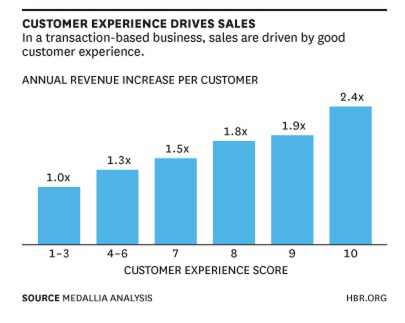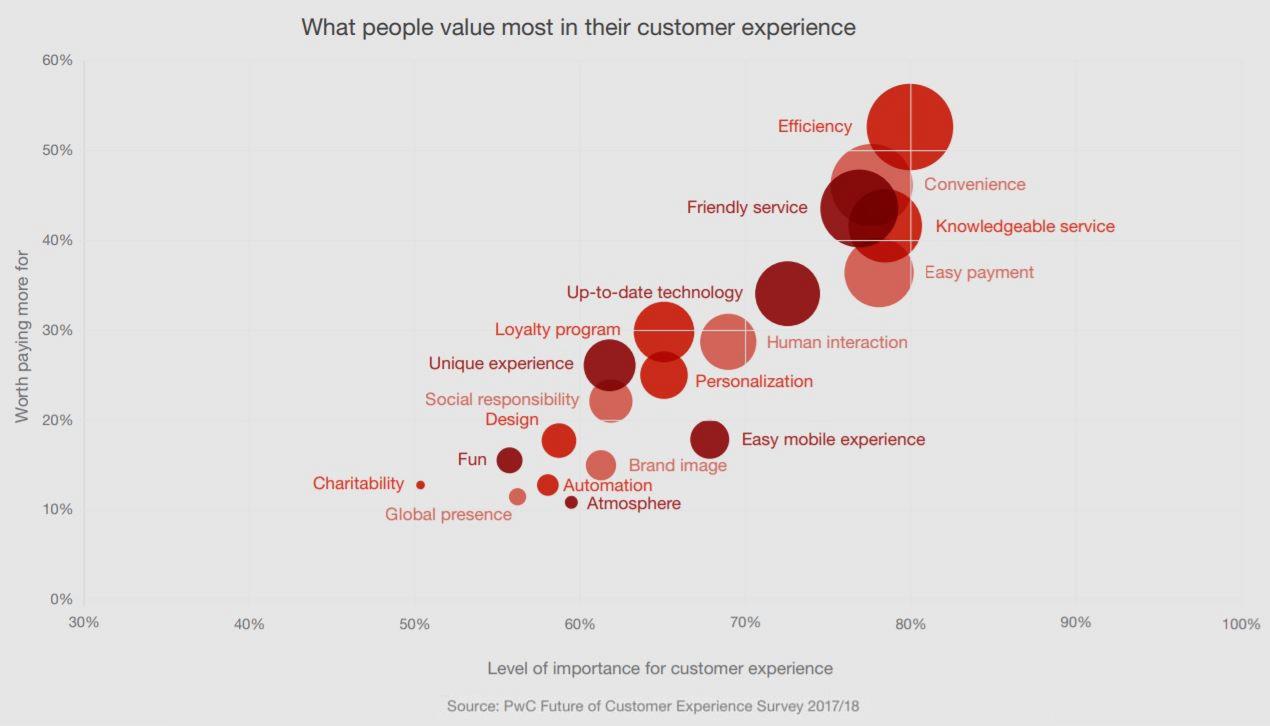The experience economy: How much is a good customer experience worth?
It would be fair to say that the way that people buy goods and services has changed more in the last 5-10 years than it has in the last hundred. But while technology, and the connected state of our everyday lives, can be blamed for consumers shopping in new ways, customers fundamentally still want the same thing that they wanted from a retailer a hundred years ago. That being good service from someone who knows their product and makes the customers trip to the store a special experience.
Lets delve back in time to before online retail came along and a trip to buy a particular product was a personal experience. Retailers knew their customers and their products, they were specialists. To an extent we can blame technology for consumers move away from the high street, but in reality, you could argue, the high street has lost its specialists, and to a degree, its product experts. At a time when low cost is perceived to be king, has the high street stopped caring about creating a memorable in-store experience? In doing this, have they lost touch with the competitive advantage over online retailers?
The pioneers of customer experience
 When Walt Disney created Disneyland, he did so at a time when amusement parks were not exactly known for their positive, friendly, family experience. From day one, what Walt Disney did differently was put the visiting families at the heart of their offering. Today Disney is an experience powerhouse, and if you ask any families with children who have been, they will tell you it’s expensive but worth it and they would consider going back.
When Walt Disney created Disneyland, he did so at a time when amusement parks were not exactly known for their positive, friendly, family experience. From day one, what Walt Disney did differently was put the visiting families at the heart of their offering. Today Disney is an experience powerhouse, and if you ask any families with children who have been, they will tell you it’s expensive but worth it and they would consider going back.
What Disney represents is possibly the best example of creating a customer experience, with customers prepared to pay for something exceptional. From the unique training that each cast member receives, to their leadership, to the way each and every member of their staff thinks about their customers and how they can delight them. Disney are quite possibly ‘the’ authority on creating a customer experience. So what can an ordinary retailer learn from them?
The 3 principles of enhancing customer service
The key points that Disney view as the cornerstones to providing a great service are: creating a common purpose, understanding your customers, and treating services as an economic asset.
1. Create a common purpose:This may sound like an overly corporate notion, something that really only applies to multi’s and large technology companies, but really what this means is simple - have you got a foundation in place or a set of guidelines that all other service related decisions can be based around? To a small retailer this could be as simple as everyone in-store understanding what you want your customers experience to be. It's important to ensure you have really thought about your customer’s experience and what you want it to entail. Ask yourself does everyone else in your store know it too? More importantly, do you think that’s what every customer gets in your retail store?
2. Understand your customers: We would all like to think we know our customers, but do you really know your customers? This principle considers how well you know your customers as a group (not to the point of knowing the names of your customers children, pets and their respective birthdays). It is the act of really thinking about that core group of customers and asking if you understand their needs, wants, and expectations. Not all of us think that we have the time to really think about these bigger picture questions, but often the key to this is feedback, and listening to your customers. What do they expect from you? How do they want to find out information when they are not in your store? Do they remember your store after they walk out the door? Or are you simply a transactional service that is unlikely to be repeated? When thinking about this point, it’s important to be critical and honest and test how well you know your customers. It could be as simple as sending a simple email to some of your customers and asking for feedback, or running a few questions via your social media channels, either way – it’s absolutely worth finding out if you know as much about your customers as you think you do.
 3. View exceptional service as an economic asset: Finding good people can be difficult, finding great people can be expensive. This could mean paying slightly more on a salary, or the time you invest in their skills. However, if you consider the value of a great experience that gains you a lifelong, regular, customer in business terms, the return on investment often justifies the expense. However, customer experience is quite an abstract benefit, I’m sure most of us would love to know what that is actually worth if we are going to treat service as an economic asset or revenue generator? According to recent study by Medallia, a customer who has had a great experience is likely to spend 140% more on their next visit. Their research is interesting because we are able to quantify how much a good experience is worth and that customer experience is a major driver of future revenue.
3. View exceptional service as an economic asset: Finding good people can be difficult, finding great people can be expensive. This could mean paying slightly more on a salary, or the time you invest in their skills. However, if you consider the value of a great experience that gains you a lifelong, regular, customer in business terms, the return on investment often justifies the expense. However, customer experience is quite an abstract benefit, I’m sure most of us would love to know what that is actually worth if we are going to treat service as an economic asset or revenue generator? According to recent study by Medallia, a customer who has had a great experience is likely to spend 140% more on their next visit. Their research is interesting because we are able to quantify how much a good experience is worth and that customer experience is a major driver of future revenue.
PWC’s The future of customer experience report reinforced that there is very much a financial value in providing a great service. They directly asked – how much extra would you pay for a great service? Are they prepared to pay anymore for it, or is it something they simply take for granted? Their research looked at a range of services, from restaurant to travel tickets to traditional retail sales, on average a customer will pay around 7% extra on their products or services if they have had a great customer experience.
If you consider one of the common complaints of retailers is that they are forced to price match or compete against savvy shoppers who will price check a product against Amazon on the shop floor (known as showrooming), and ask yourself if that customer was being served better, or having a different experience at your store, would they have their phone out and would it be all about price?
So what do retail customers value when it comes to experience?
According to the same piece of research, it’s really not all about creating flashy services, and spending on huge amounts of in store technology. When it comes to service they will pay more for its about four things, friendly service, knowledgeable service, convenience, and efficiency. Each one of these points are things that any retailer should be able to provide. When we talk about indies being specialists, knowing their products and being willing to really help their customers, providing a great service becomes more about the ethos of the people who interact with your customers on a daily basis.
Some of the more unusual points in here are around uniqueness, social responsibility even “charitability” are things we just wouldn't have seen in a survey of this kind even 5 years ago, these are factors that we know matter to millennials and generation Z, more than any other customer group we have seen before. As we look at other ways that traditional retailers can win against online it’s refreshing to see that customers really value the things that do not cost vast amounts of money to implement.
It would seem that the key to really great service, is getting the basics of good service right, being knowledgeable, friendly, and efficient. Perhaps the worrying side to this is that the most customers don’t feel that they receive this in the majority of their retail experiences.
Looking for more retail insight? Visit Autumn Fair and take part in our free workshops and seminars.


)
)
)
)
)
)
)
)
)
)
)
)
)
)
)
)
)
)
)
)
)
)
)
)
)
)
)